#romance meta
Explore tagged Tumblr posts
Text
The Thing About Solarpunk Romance

Something that is quite interesting to me is a certain dualogy within the few novels that have been released for the genre is that there are basically two different kinds of novels there - and then there is Fox Hunt, but let me first talk about the novels there are.
Now, mind you. This list involves only novels that according to my information were written to be Solarpunk Fiction, rather than novels written at times before the invention of Solarpunk, that the label was later applied to. And these novels are:
The Biodome Chronicles by Jesikah Sundin (a Solarpunk vs Cyberpunk story)
The Summer Prince by Alaya Dawn Johnson (Solarpunk YA)
Foxhunt by Rem Wigmore (a Solarpunk action novel)
Seeds of the Swarm by Sim Kern (a story focusing on establishing Utopia)
Another Life by Sarena Ulibarri (kinda an anthology in a meta narrative and with a heavy philosophical focus)
When We Hold Each Other Up by Phoebe Wagner (a story about a Solarpunk society emerging after ecocide)
Now, it might be that I am overlooking some books here, especially as most Solarpunk publishing is happening within the context of Indie publishing and self publishing. So, if I do not hear about it through social media, I will probably not hear about it at all. And sure, I can go through Amazon and look at books tagged as "Solarpunk", but I am just guessing.
Outside of that, there is only the many, many anthologies that have been released, but I will not generally talk about them right now.
Now, I generally have the feeling that a lot of Solarpunk writers are like me: Oh, I have a story idea for a Solarpunk novel, but... I am not quite motivated to write it. Pretty much all writers I have been in contact with who were at some point writing a Solarpunk novel have put that project on pause to write something else. (Which is probably an issue for another day.)
But no, what I wanted to talk about is: Of those six books above I have read three so far. The first three. The first two I would actually categorize as romances. While both Biodome and Summer Prince involve of course the dystopia/utopia connundrum happening, they both have very much the same feel I would argue a lot of the dystopian YA novels that were released around the same time as those two novels (earlier half of the 2010s) had to me. Sure, there is a story, but in the end the books have a strong core in the main relationships.
Foxhunt also had a romance, but it really felt more tertiary to the plot and was not a focus of the story for the most part.
As I said, I have not read the other three novels yet. But yeah, this is what I can say about it. And I do wonder...
I am honestly not quite sure whether those first two novels were written as Solarpunk. I know that at the very least The Summer Prince was marketed under the tag, but that is pretty much where my knowledge ends.
It makes sense though, that those books came out at the time they did. They were just riding the dystopia high related by the Hunger Games, nothing else. And because of that there are the romance subparts there.
But here is the thing: In some way romance is a strange viability marker. No matter what kind of base idea exists, there is a romance subgenre that deals with it. Because no matter how much pretty much everyone derides the romance genre, it is actually the best selling genre of literature there is. If you look at the fiction genres, there is romance (including smut), then there is mystery/crime, then there is nothing, and then there is everything else in terms of both sales and the number of stories there is. Romance sells more books than fantasy or scifi can dream off. But at the same time Romance has crossover with pretty much every other genre, because Romance can happen in any genre.
Let's face it, the different between most superhero movies and a romance is the central focus of the story. You absolutely could restructure the Iron Man movies in a way to make them romance movies that happen to also feature one of the main couple to be a superhero.
And yes, there is a ton of superhero romance out there in the book market. Because no matter what concept there is: There is romance of it.
Now, I will openly admit: Cyberpunk is also a genre where at least the English and German market does not have a whole lot of romance. Sure, there is some, but not a whole lot. (Japanese Cyberpunk ironically has spawned a whole lot more romance - but again, a topic for a later date.)
But it is interesting to me. Romance is fairly accessible in terms of the SP market, and I note that it is interesting how there is little in terms of Solarpunk romance out there. Now there is the question: Is this because the main audience for Romance does not know much about Solarpunk - or because they don't gel with it.
I don't have the answer for this. But I cannot keep but wondering.
What do you think?
#solarpunk#lunarpunk#climate fiction#clifi#romance#scifi romance#utopia#utopian romance#romance literature#solarpunk meta#romance meta
22 notes
·
View notes
Text
I've been reading some somewhat older (late 90s to early 2010s) historical romances lately, and like... they were so much sexier?
And it's not that these books were soooOOOOOooo explicit, because they aren't, necessarily (although it's not like they're tame, either). They don't get super creative in terms of kink, or even acts like anal play.
But it honestly feels way less self conscious, in a lot of ways. Stephanie Laurens is famous for writing loooong sex scenes, but her sex scenes just also... it never feels like she's COUNTING. She's not self conscious. It never feels like these scenes are things her characters wouldn't do. Scandal's Bride has like... legit somewhere around 7 sex scenes in a 400 page paperback, with many alluded to scenes otherwise? Whereas in the preceding book, A Gentleman's Vow... it's still a lot hotter than many historicals today, lol. But it's not as many sex scenes, at all. Because how could Vane and Patience, who are unmarried and in a house full of people looking for scandal, have sex whenever they want? Like they do it a lot, but while Richard and Catriona in SB are married fairly on in the book, they aren't very good at talking about their feelings (whereas Patience and Vane are better at expressing their feelings, they just aren't on the same page) which leads to them expressing their emotions much more... physically.
And the thing is that there is zero self-consciousness in Laurens's writing. It doesn't feel CONSTRUCTED. Although there are absolutely many writers who do write great sex scenes today... In some cases, I feel as if they are either being restrained, or writing sex scenes simply to create a BookTok Moment. And neither approach really works for me, because in both cases they are unnatural. If you're holding back because you want your book to be safe for the hesitant romcom crowd, you're not writing what you want to write. If you're creating a moment just to be a Moment, you're not writing what you want to write. Nor are you following what the characters would do.
Like I said, there is a lot... of activity... in Scandal's Bride. But it's absolutely consistent with the tone of the story, the humor, the way Catriona and Richard interact. It's GREAT. It's funny, it's ribald, it's entertaining. It is true to Laurens's style.
I can say the same of the MacKenzie books by Jennifer Ashley. The Duke's Perfect Wife, for example--Hart and Eleanor just do things... to do them. They're passionate about each other. I see this book critiqued because we get a lot of previous allusions to Hart's "tastes", but the novel ends with him just introducing Eleanor to his preferences--which makes sense, because she's inexperienced in general (and another reason which makes his restraint pretty understandable). To me, this felt totally natural, and consistent with his insecurities, his fears of scaring her off, and again, her level of experience. Eventually, they will clearly be freaks together. The novel never shames him for his interests. But they're not quite ready for the level of intensity that I think readers have become used to because of this need to have A Moment, and I think Ashley was honestly following the natural path there, versus being encouraged to tone it down (and again, I think agents and publishers ABSOLUTELY have encouraged authors to tone it down in some cases--I know of one specific case. But I don't think that's ALWAYS what happens.).
As I wrote all of the above, I thought of a book that is totally unrestrained, wild, and maybe? Over the top compared to the heroine's experience--Kresley Cole's Lothaire, which does feature a virgin heroine getting preeeeetty intense pretty early. But like--the degree of things that lead up to the Big Thing ramp up, she's not actually a babe in the woods, and this is a paranormal romance about a certifiable vampire. That's part of it all, to me. You're not just trusting the character beats, you're trusting and aligning with the tone of the books. Kresley Cole can go crazy with her paranormals because the rest of the book is crazy (and Scandal's Bride has a similar thing, imo).
I do think that as romance has become a more competitive, heavily saturated market, there is this struggle and pressure to stand out, which has created some artificiality re: Moments. And that's why these older books ring truer for me.
#romance novel blogging#romance meta#i guess?#romance novels#WE HAVE TO GO BACK!!!!#and for the record i think great books are being published right now#but this element seems more consistently strong in the days of yore
9 notes
·
View notes
Text
hey writers we have to talk.
if you've read any romance or fanfic in the past twenty years (i know you have), you know that there are a certain number of scents associated with hot dudes. you can probably recite the list of Things Men in Fic smell like in your sleep: leather, black pepper, pine, sandalwood, "something uniquely him", clean sweat, and if the character has ever fucking been within 50 yards of a firearm, something called "cordite".
here's the thing.
NO ONE SMELLS LIKE CORDITE.
cordite was a highly specific type of smokeless gunpowder developed in the 1890s by england specifically and used mostly in wwi.
if your good-smelling guy is not (a) english (b) using a very specific type of british rifle (c) dying in a trench in flanders, he does not smell like cordite. technically even if he does meet all those conditions he still doesn't smell like cordite because he smells like trenchfoot.
the point is, cordite is so far from universal that no one but the most hardcore gun nerds give a single shit about it. making your Sexy Hero smell like cordite is like naming a cassette-only bootleg live recording from the 1970s as your favorite grateful dead album. everyone at the party hates you immediately and knows you're doing it for clout. also, it's just factually... wrong. please stop. i know everyone else is doing it, but you can do the right thing here, i believe in you.
so what do people who are using guns smell like?
well if your story is set before the late 1880s, the smell of a fired gun is black powder, which, unfortunately, smells like seventeen flatulent cows have been shoved in a tire factory. trust me, you do not want your Hot Dude to smell like black powder. it's b a d.
if your story is set after the late 1880s, guns are using some variety of modern 'smokeless' powder - which speaking broadly doesn't really have a ton of scent when used. it does have some, but it's sort of non-descript: the best way i can describe it is the sweet, ozone, hot-plate smell of popping your car hood with a warm engine.
people who use guns a lot don't smell like fired guns all the time anyway, so while those scents might work in a fight scene, they're not realistic all the time. but there are some things that your Sexy Shootist will smell like basically 24/7 and that's metal and gun oil. metal you can go and sniff (i recommend non-stainless steel), but if you want a reference, most gun oils have a sharp, organic smell that's not dissimilar to canola oil but muskier and with a tang overtop. it's not unlikely leather is in the mix as well due to routine handling of leather equipment and gear. modern gear also tends to have a certain smell although it varies by production country and storage conditions - lots of opportunities there.
in conclusion: gunslingers and hired killers and military folks can be sexy and smell great on page, but i am begging you not to say "cordite" when you mean "gunpowder" ever again. we can do this. we are writers and therefore pedants. i believe in us!
#i will kiss the first romance writer who makes their MMC smell like cosmoline on the mouth#(actually don't cosmoline smells fucking awful)#firearms#romance novels#fanfic#meta#writing reference#also if anyone has a hypothesis about WHY cordite took off i would love to hear it#historical firearms#nb4 the gun nerds show up yes this post does contain sweeping generalizations about the history of gunpowder
4K notes
·
View notes
Text
Y'know, there's this gripe I've had for years that really frustrates me, and it has to do with Love, Simon and people joking about it and calling it too-pg and designed-for-straight-people and all the like. (A similar thing has happened to Heartstopper, but that's another conversation.)
I saw Love, Simon in theaters when it came out my senior year in high school. I saw it three times, once with my friends/parents on opening night, once with my brother over spring break, and once with my grandparents.
On opening night, the air in the room was electric. It was palpable. Half the heads in there were dyed various colors. Queer kids were holding hands. We were all crying and laughing and cheering as a group. My friends grabbed my hands at the part where Simon was outed and didn't let go until his parents were saying that they accepted him. My friend came out to me as non-binary. Another person in our group admitted that she had feelings for girls. It was incredible. I left shaking. This was the first mainstream queer romance movie that had ever been produced by one of the main five studios, and I know that sounds like another "first queer character from Disney" bit but you have to understand that even in 2018 this was groundbreaking. Getting to have a sweet queer rom-com where the main character was told that he got "to breathe now" after coming out meant so much to me and my friends.
But also, from a designed-for-straight-people POV (which, to be frank, it was written by a bisexual author and directed by a gay man, this was not designed for straight audiences), why is it a bad thing that it appealed to the widest possible audience? That it could make my parents and grandparents see things in a new light? My stepdad wasn't at all interested in rom-coms but he saw it with me because it was something I cared about and he hugged me when we came out of the theater. My very Catholic grandparents watched it with me and though my grandpa said he still didn't quite understand the whole 'gay thing,' all he wanted was for me to be happy and to have a happy ending like Simon did. My Nana actually cried when Simon came out and squeeze my hand when his mother told him he could breathe.
And when Martin blackmailed Simon, my mom, badass ally that she is, literally hissed "Dropkick him. Dropkick him in the balls" leading to multiple queer kids in the audience to laugh or smile. Having my parents there- the only parents, by the way, out of my group of queer and questioning friends- made multiple people realize that supportive adults were out there. That parents like those in Love, Simon do exist in real life.
When people complain about Heartstopper not being realistic or Love, Simon being too cutesy, I remember seeing Love, Simon on opening night. I remember my friend coming out and my stepdad hugging me and my mom defending us through this character. I remember the cheers that went through the audience when Bram and Simon kissed and the chatter in the foyer after the movie was over and the way that this movie made me understand that happy endings do exist.
Queer kids need happy endings. Straight people need entry points to becoming allies. Both of these things can come together in beautiful ways. They can find out about more queer culture later, but for now, let them have this. Let them all have a glimpse at a better, happier world. Let them have queer joy.
#love simon#simon vs thsa#simon spier#spierfeld#bram greenfeld#my experiences#meta#the importance of queer joy#heartstopper#becky albertalli#my mom also watched rwrb with me last year when it premiered#and let me tell you that was interesting sitting in the room with her for an r-rated romance movie like that
13K notes
·
View notes
Text
i'm just going to go ahead and make this its own post. when kirk teases spock he is SO GENTLE. "why mister spock are you feeling emotion?" and he lets spock do the vulcan equivalent of giggling and kicking his feet and going "haha nooo silly i'm a VULCAN i don't do that!!" and kirk's like "oh my apologies mister spock of COURSE not" and then they make consensual loving eyecontact with one another while smiling. when BONES senses blood in the water (spock having an emotion) he will grab spock by the scruff of his fucking neck and shake until dead. like a dog with a squirrel.
#personal#star trek blogging#tos lb#SPIRK#SPONES#in both instances this is romance btw.#liz's star trek stuff#liz writes meta
12K notes
·
View notes
Text
it's wild to me that people act as if chani's primary reason for leaving paul was bitterness about being a concubine like girl..... i promise that did not even register in her brain compared to the realization that paul had chosen to become her people's oppressor, to become her oppressor, to destroy the equality that was very foundation of their relationship. i promise her agency and her loyalty to her people, things which existed before paul and will exist after him, were more important to her than how "official" her relationship would be considered within a system she did not care about.
#stop reducing female characters to their romances challenge#chani#paul atreides#paul#dune#dune part 2#dune 2#chani kynes#meta
3K notes
·
View notes
Text
Gale's act 1 romance is just so good. The more I think about Gale the more I like it. It shows off so many parts of his character - how integral magic is to him, his love of teaching, his smugness, his appreciation for your friendship... But also his vulnerability. Before you picture something more - he looks pleased. Happy to share a moment with you as friends. (During the party he even expresses hoping that he can consider you a true friend. A self-professed rarity for him.)
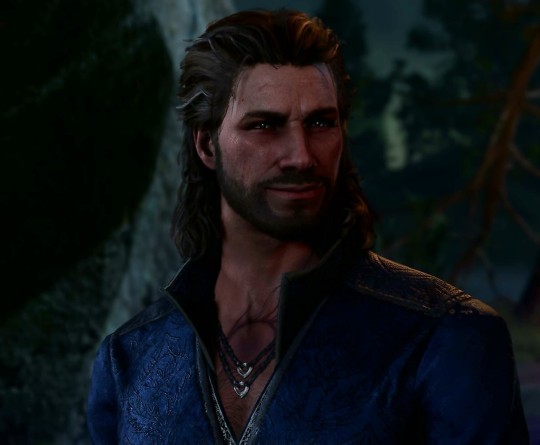
At the same time he's making this face though, he moves closer to you. Whether he would acknowledge it or not, Gale clearly does seek out that intimacy.
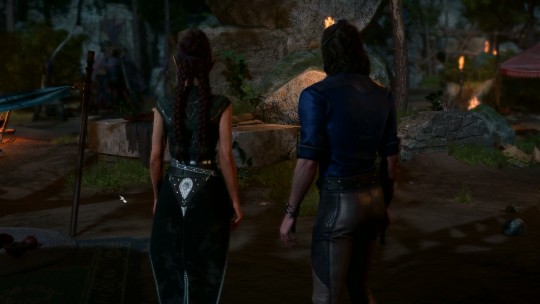
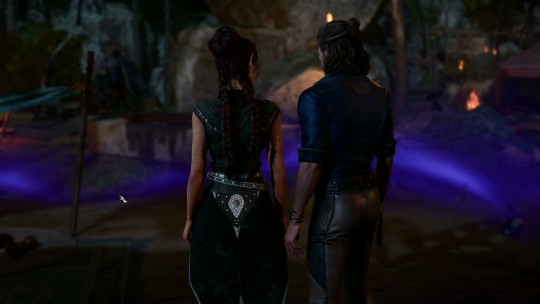
His earnest surprise after pulls at my heart strings. He genuinely wanted to find a safe way to connect. He had no expectations of you returning his feelings (hence, embarrassment - at being perceived, or at not considering your feelings, perhaps.).
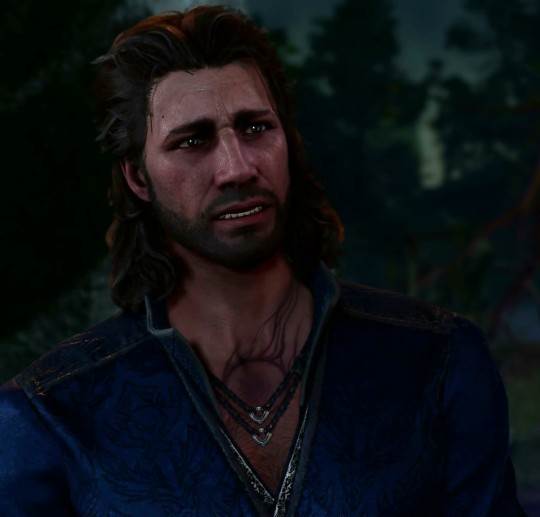
Followed by a resigned shoulder slump and a face of desperate yearning... 🥺 It's almost the same pouty face he gives you when he confesses he loves you.
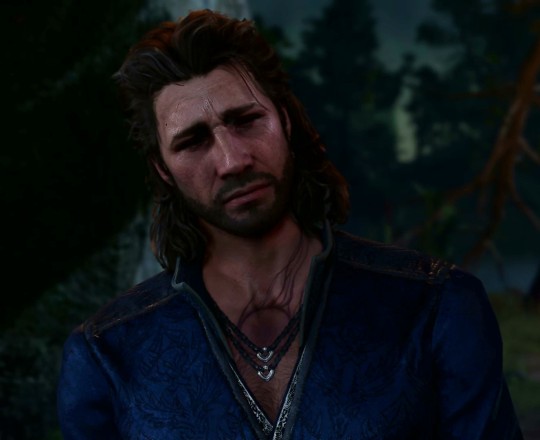
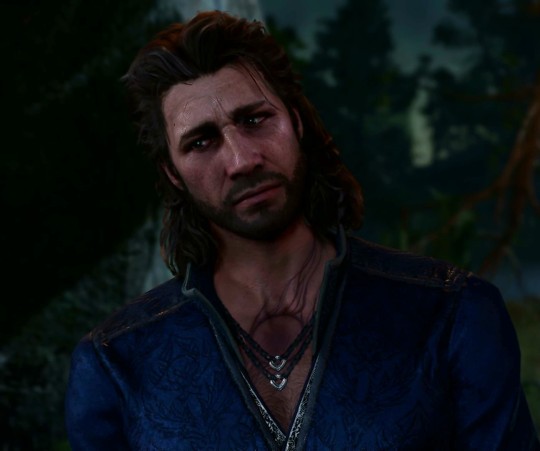
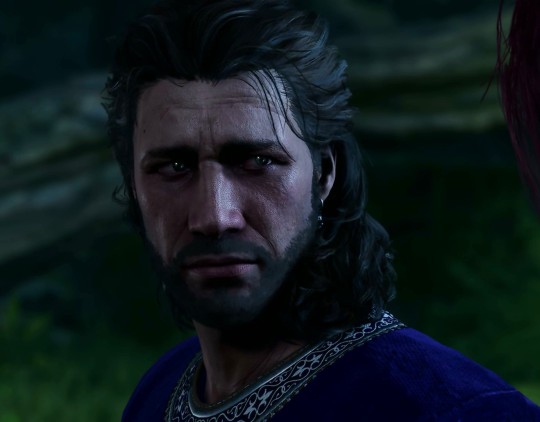
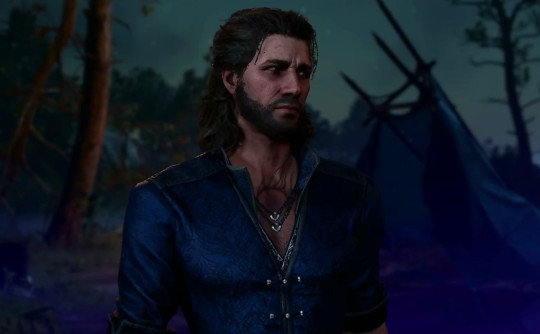
Then, genuine thrill - elation - at the very idea of it! Gale has a firm grip on what he shares with us here - he's still an archmage level wizard (even nerfed), and that's a skill he would have. (It's probably why we don't ever accidentally connect tadpoles with Gale). He chooses after his initial surprise to share a feeling of not just joy but a joy with pride and optimism. He turns *towards* you - communicating not just elation but desire in his expression.

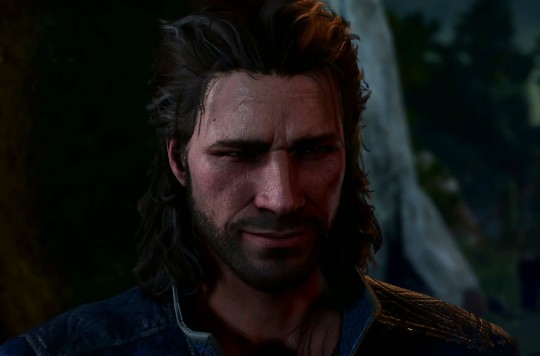
But he immediately follows this with an 'oh shit, stop thinking about it' look and a long shake of the head to clear the thought(s) away 😭 (Because trepidation here isn't about kissing you - it's about the orb.)
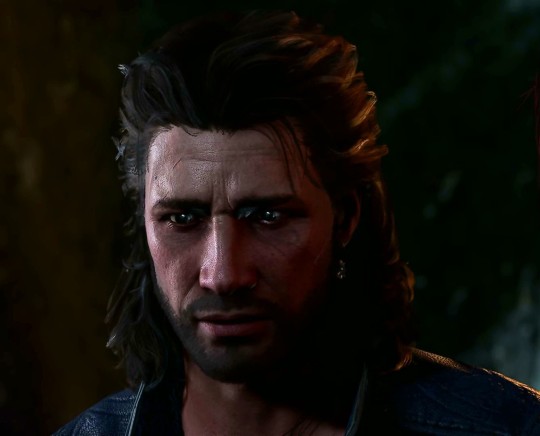

But he's quick to reassure you - not just because he knows you wouldn't be able to hide your thoughts from him (not an option - even picturing nothing carries a feeling with it) . "But it is a pleasant image, to be sure." And then he hits you with a confirmation of his desire and approval. "Most pleasant, in fact. Most welcome."
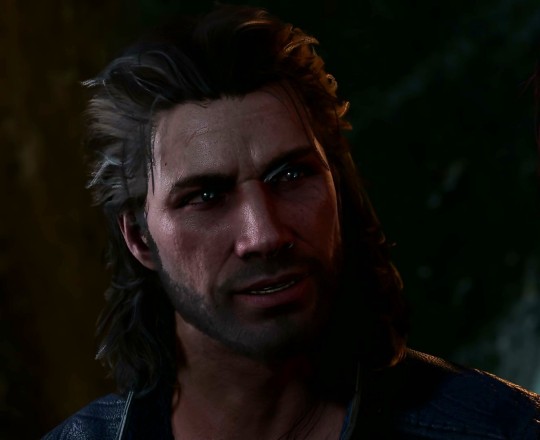
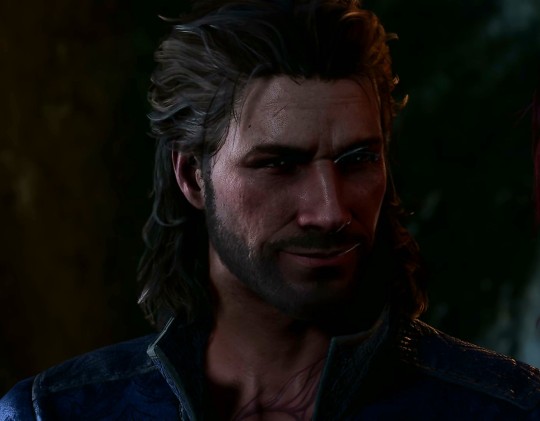
He hadn't considered it a possibility, but gods be damned, you've given him the first burst of hope and confidence he's had in a while. The first time in months he's felt wanted. His posture straightens with the confidence boost. He turns fully to you and clearly wants to bask in the moment - to connect with you.

But then the Weave evaporates. Whatever the reason may be, Gale didn't do it. He didn't expect it. Clearly. He posture collapses and he whimpers like it physically hurt.
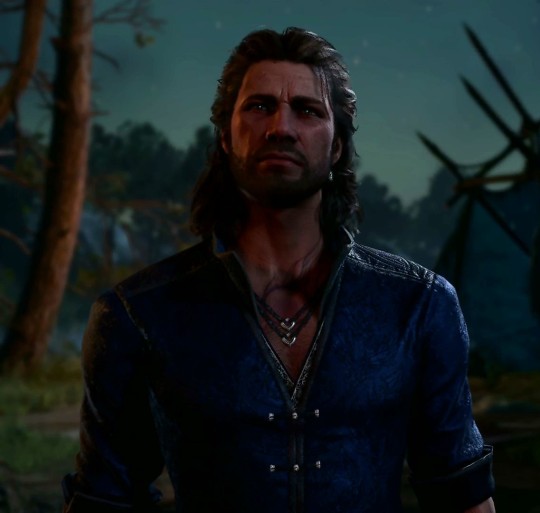
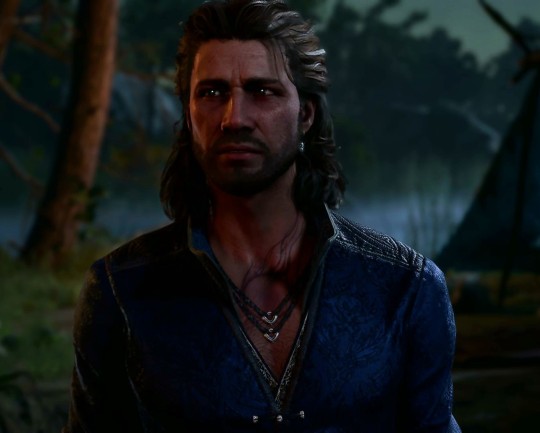
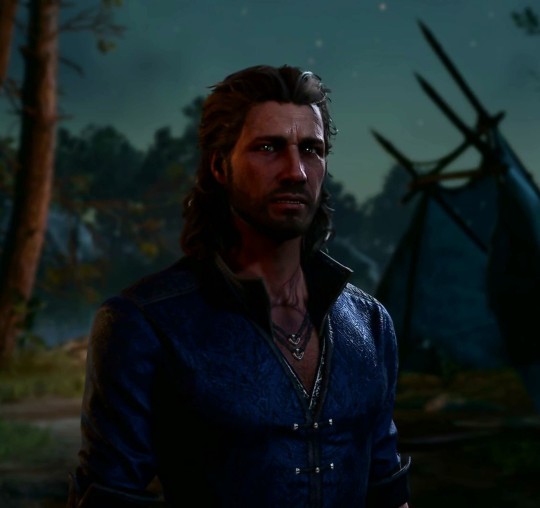
The narration makes it clear how jarring the connection ending feels to us (cold and lonesome) - how must it feel for poor Gale? He hasn't had such a strong connection with someone in ages. Who knows how long since it was with another mortal (if ever)? We know from later stages of his romance and from communication with Gale that physical touch is an integral part of his expression of love and connection. And with the orb he can't have it. The loss of intimacy and connection here hurts.
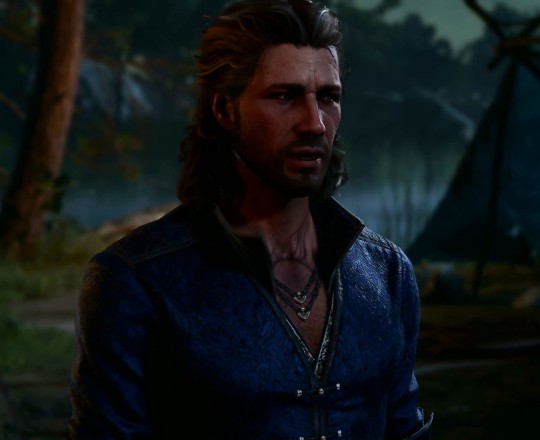
"How easily things slip away from us." How easily they are lost. Anyway go hug your wizard.

#gale dekarios#gale of waterdeep#galemance#bg3#gale x tav#act 1 romance#a moment in the weave#ridiculously pretty man needs to be loved#in my feels#bg3 meta#my wrtitng
1K notes
·
View notes
Text
The thing about romance is, it makes a good story.
As soon as Neil described season 2 as "quiet, gentle, romantic" I figured we'd be in for it, because as he's the first to point out, writers are liars. And the best way to deceive is with truth.
Season 2 is romantic. The trappings of romance are everywhere. Crowley tries to set up Nina and Maggie by trapping them under an awning during a rainstorm, a classic cinematic bonding technique. Aziraphale's chosen method comes from his beloved books: the ball, the dancing, appearing as a pair in public, hands held as you twirl gracefully with your heart thrilled and racing. If they can set up a sensational kiss that will unlock the happy ever after. They've lived on earth, they've studied the tropes, they know how romance works.
The problem is a story is only a story.
Nina and Maggie had the classic romantic setup completely by accident before Aziraphale and Crowley ever began trying to interfere with them. They get locked in Nina's coffeeshop. They can't escape or communicate with anyone else, they end up talking by candlelight because there's no electricity, Nina offers wine. Maggie mentions how she'd hoped for a chance to talk to Nina, and now here they are. It's every bit as much a standard as what Aziraphale and Crowley attempt to arrange. Blanket scenarios galore exist because of that starting point. We love that story. And there's nothing wrong with that.
But it's still only a story, it's not enough. Because once that moment of connection is over, however lovely it was, all the rest of the world comes flooding back in in the form of dozens of angry text messages. Nina's messy entrapping relationship hasn't magically gone away just because she and Maggie shared a romantic encounter.
And it's so tempting think oh well, that's easy. We'll just give them more romantic encounters and eventually those will overwhelm the rest of the baggage. Must do, because it'll make them fall in love, and once they realize they're in love that trumps all other considerations, right? So it'll be fine. Love Conquers All.
Neil also mentioned Pride and Prejudice.
Darcy knows he's in love early on and makes a disasterous proposal that shows that he has no understanding of Elizabeth's perspective, possibly hasn't even thought about it. They've been meeting in forest lanes for walks, conversing, had tete-a-tetes in the sitting room, danced at a ball. And while his turn of phrase isn't as flattering as he thinks, he's still offering her everything he thinks she wants and needs: affection, security, his good name, wealth, an escape from the embarrassments of her situation, the world. How can there be anything to object to? Why would anyone ever refuse so much of value?
Elizabeth quite rightly cuts him to pieces. He lashes back with a few hard truths of his own and they separate. During that separation, he thinks and he learns. He takes to heart the criticisms she offered, re-examines his assumptions, opens his eyes. Thinks about her perspective and how sometimes the only difference between pride and arrogance is where you're standing. He does the work. When they meet again he tries to demonstrate that he's learned--not in order to court her again (yet), but because the only real apology he can offer, the only one that would have weight, is to show that he's grown, he listened to her. He changed.
Elizabeth of course has her own journey, accepting that many of her own conclusions about Darcy were erroneous because they were formed without her having the full picture to hand, and once she's done that she has to apply it to her own situation as well. She loves her family, but they do place her at a disadvantage on a number of levels, leading eventually to full-out disaster as her younger sister carelessly ruins all of their reputations. It's hard to admit, it's mortifying, but Darcy was offering her a great deal she needs. His offer did have worth for all that she dismissed it as an insult. And as she learns to value his own character more highly, and then as she sees that he did listen to her even though she insulted him so thoroughly...well, she grows too. And when they do eventually come together it's not because of courting and balls. There's a big romantic gesture in his rescue of her sister but even that isn't why they'll get their happy ever after. It was just the catalyst for the conversation. They win because they've learned how to understand each other and how to communicate for the future. How they can strengthen and support each other, how to balance their strengths and weaknesses. The films leave them at the wedding, but the book shows a bit of their marriage too, and during it they keep learning from each other. Their relationship is held up as a superior love story for good reasons.
The end of season one was romantic too. Crowley stopped time rather than face a world where Aziraphale would never speak to him again, Aziraphale walked into hell to protect Crowley, they dined at the Ritz and toasted the world. But then they stopped. Sure they spent time together, talked, enjoyed each other's company. But if they were talking about important things would Crowley still be living in his car? They had a bit of respite but all that real world baggage that exists outside of the romantic moment hasn't been faced, none of it. Four or five years sounds like a long while but for beings who are quite literally older than the earth? That's just an intermission.
Nina's relationship ends, leaving her with a tangled mess; Maggie realises the sweet dream of love she's been longing for isn't as important as the real Nina. They talk. They plan. Nina will sort through her life, get closure, figure out what went wrong with Lindsay and what she wants from a relationship, learn how to ask for respect instead of just bending under her partner's demands. Maggie will support Nina the way Nina needs, which sometimes means helping her get oat milk for the shop and sometimes means giving her processing space. They're on the same page; they're going to do the work. That's why most likely they'll succeed. To quote one of my favourite fanfics: it's not happily ever after, but it's a chance. It's all going to be okay. (The Profane Comedy by Mussimm, who absolutely nailed this theme)
The romance is nice, it's lovely. We need it to keep ourselves going. To give ourselves the dreams that help us get through the days and nights. But it's not the relationship. It's not enough on its own. The wedding can be the grandest most beautiful ceremony ever with doves flying and sweeping music and bells ringing, but that doesn't guarantee the marriage will last.
Crowley and Aziraphale have had their romantic gestures, oodles of them. One wing raised to protect the other from falling stars, another from rain. Shared ground, shared interests, hands offered in friendship and held on a bus. They've tried to get to the same page, they really have. They just aren't there yet. The biggest most important things still haven't been talked about, and season 2 showed there are even more of those big important things than we'd realised.
The show paints Maggie as Aziraphale's foil and Nina as Crowley's, even to the point of Nina casually calling Maggie 'angel'. But Aziraphale's baggage is Nina's. The toxic relationship has to be processed and understood and closed, and it hasn't been, despite season one. Lindsay never really liked Nina very much, for all that they tried to keep her trapped; Heaven never really liked Aziraphale very much for all that he believed in it. They both let themselves be used. But Lindsay left Nina and went to their sister's, whereas now the head of Heaven has reached out to Aziraphale and said here, we can fix this, you can fix this, don't you want to fix this? Others are already writing about that and maybe I'll add to it later, not sure. And Crowley, like Maggie, has had a sweet dream that he has to set aside. Maybe he'll be able to pick it up again eventually, maybe not. But sometimes you offer support by buying oat milk or rescuing your beloved from the legions of hell, and sometimes you do it by standing back while they sort through their shit.
Quiet, gentle, romantic. It was.
But that's only part of the story. Now they have to do the work. They thought they had, but they were wrong, because there's so much they just hadn't touched yet and tried to cover over with relief and sleight of hand and alcohol and forgiveness. The apology dance doesn't mean much without showing that you listened and learned. They've faced so much trauma already and that should have been enough, we wanted it to be enough and so did they and it's such a blow for it to turn out that there's still more to do, that the baggage hasn't just gone away and can't be hidden under blankets or soothed with cocoa. The texts are still coming in and demanding answers.
But it'll be okay. It will. It's still a chance. And one that in the long run makes them better, builds something real that lasts.
The best stories, the ones that last longest and become classics, are the ones that don't end with the kiss under the awning or the blanket scenario or the wedding. They're the ones that heal us while the characters heal themselves. It's hard to accept that there's still more to do. Harder to imagine how it can possibly work out. And yes, bloody frustrating to wait and see.
And we'll get through that interim by telling even more stories. Because the story is never just a story. It's how we get through the work, it's what we tell ourselves so we can do the damn work. Stories are what we cling to and how we remind ourselves we're human and connect. A book is a person you can carry with you. We're not alone, none of us, stories connect us because we love them and see ourselves in them, which means we see each other.
Aziraphale's back up in Heaven to deal with his unfinished baggage; Crowley left his behind long ago and it's clearly going to come back and bite him in the arse however much he tries to go his own way. And they can't help each other with that. Not yet.
But they'll get there. So will we.
#good omens#good omens season 2#gos2 spoilers#good omens season 2 spoilers#crowley#aziraphale#ineffable husbands#nina#maggie#nina and maggie#stories#romance#relationships#am I projecting here#of course I am isn't that the whole point?#pride and prejudice#elizabeth and darcy#quiet gentle romantic#good omens meta
6K notes
·
View notes
Text
Davrin's past and his Dalish clan and his vallaslin (all mentions I could find)
So much in the game is hidden behind banters between companions (which is ahhhh a bit annoying) so I compiled all the banter and information I found about Davrin's past.
Not really plot spoilers, just Davrin spoilers.
At the end I will summarize everything in a bullepoints list.
Bellara and Davrin banter:
Text here (link)
There are also a few other banters I did not record where it is implied Davrin does not care about the gods or some other late game revelations. The only thing he cares about (and mentions again later in game, in a main scene) is how people see Dalish and elves, and how to minimize the risk of humans hating elves even more.
Taash and Davrin's banter (text in description for each image)



Davrin's quests information:
Here are other mentions from Davrin first quest: Rook: How did it go? Davrin: Poorly. They felt like I rejected them. Rook: Did you? Davrin: Yeah, I suppose. Clan life wasn't for me. I had to get away. Rook: So then what happened? You're out in the world, looking for adventure… Davrin: Got my ass kicked. Went broke. Davrin: I couldn't go crawling back to my clan a failure. Doubt they'd take me back. It forced me to figure out what I was good at. Always had a knack for hunting.
Other info we get from the Halla quest is that: Davrin spent summers tending Halla as a kid alongside Eldrin, who is not his uncle, but like an uncle. So this is a case of Davrin wanting to spend time with Hallas, or being made to by his clan. Eldrin's vallaslin is Ghilan'nain:
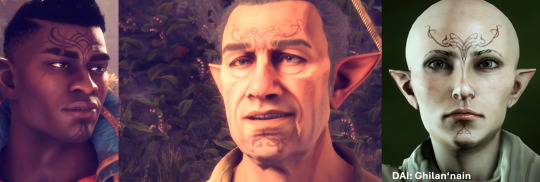
So it could be that Davrin's new vallaslin might be Ghilan'nain too. But I think it is Andruil's or a mix of the two.
Davrin could have gotten the vallaslin to honor Eldrin (we know he is the only member of his clan - if he is part of his clan - Davrin has no trouble contacting, even if they seem to have not met each other's in a while). But we also know Davrin was a hunter.
Eldrin was also the one who taught Davrin what to hunt basically. In his first quest Davrin says "When I was a kid, I'd hunt just about anything. Rabbits, deer, fox. Eldrin gave that purpose. Taught me the Way of Three Trees. The Way of the Arrow, Way of the Bow, Way of the Wood."
This is from Andruil and if we look at all three vallaslin:
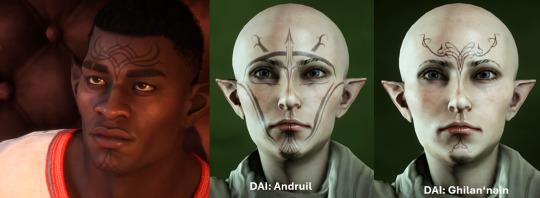
Emmrich and Davrin:
(they have some discussions about Davrin not believing in the Fade or liking it, this is the one which mentions the Dalish clan)

There are also a few other banters at the Lighthouse that mention the Fade and the sky. Mainly they are about Davrin being uncomfortable with the open space and stuff about him disbelieving the Fade: "Good. Because it's not the sky. Emmrich says it's the Fade. Me, I don't know what to think."

Final banter with Davrin:

So basically, the summary of what we know for certain is:
Davrin left his clan voluntarily because he felt restless, he did not care about tradition and lessons, and he wanted to see the world
He felt like he did not fit in his clan since he was a kid
He was also hunting everything he could find until Eldrin taught him the way of the Three Trees and to protect life by hunting darkness (monsters)
Eldrin is like an uncle for him and lives isolated (unsure if he is part of Davrin's clan) and Davrin used to spend summers helping him with the hallas
Davrin feels like he pissed off his clan, he rejected them and both Davrin and Bellara agree it would be hard for him to go back
In another dialogue, he says he actually did not think the clan would take him back at all even if he crawled back asking for help ("Like a failure" he says)
He does not regret joining the Grey Wardens and looking for adventures, but he seems to regret that came at the cost of leaving the clan and not being able to return or keep in contact with them
Also, he says the outside world was different from what he imagined
PART 2 HERE
#davrin#dalish#veilguard#datv#dragon age#eldrin#bellara#emmrich#taash#davrin romance#sort of#veilguard spoilers#meta#da meta
526 notes
·
View notes
Text
doomed yuri this, doomed yaoi that, Arcane offers u doomed straight
also timebomb is such a dope ship name wth

#sapphic#wlw#wlw yearning#lgbtq#lgbtqia#lesbian#romance#romantic#sapphism#wlw post#arcane caitlyn#arcane jayce#vi arcane#caitlyn arcane#arcane 2#arcane#arcane season 2 spoilers#arcane s2#arcane s2 spoilers#arcane season 2#arcane meta#league of legends#vi#jayce talis#jinx#arcane spoilers#vi x caitlyn#vi league of legends#vi and jinx#caitlyn kiramman
962 notes
·
View notes
Text
the choice between Edward & Jacob is not a question of which relationship is healthier or which partner is best suitable for Bella. neither is correct. neither is best. neither produces a happy ending for Bella. at the end of the day this is still a vampire novel. any choice Bella could make would yield, at best, a bittersweet happily ever after.
if she chooses Edward, she gets the terrifying Breaking Dawn ending: a girl who rejected her call to grow up has hung her love & her eternity on an emotionally stunted partner who hates himself marginally less than he loves her. she's a teen mom with a kid she never wanted who perpetuates the generational trauma passed down from her parents. by keeping this child, the Cullens have set the stage for an uprising/cold war against the Volturi who are likely to take revenge in order to maintain power. Bella is living in a tenuous "dream come true" wrapped in a nightmare & doesn't realize it.
choosing Jacob is the true coming-of-age ending that rips the stitches out of a wound that never fully healed. even if we ignore the fact that she ends up with a man who sexually assaulted her (we must bear in mind Jacob's character is influenced by smeyer's racism, but it did happen), they can't have a secure romantic relationship. based on the high imprinting rate of the pack, Jacob will likely find his imprint in his lifetime & will lose himself to the imprintee. he will no longer be her Jacob. he will inevitably abandon her (whether he wants to or not), & she must reconcile with the reality that she will always be inadequate to Jacob's imprint. & say he never manages to escape the vampires? he will presumably not age for a long time, meaning the relationship Bella always feared with Edward (her being an old grandmother while he stays forever young) remains a possibility. this is the story of a girl who slaps a Band Aid on an open wound & calls herself healed while flinching every time she sees the shadow of the knife that cut her.
if she chooses neither (team therapy), her healing requires her to lose or be at least partially disconnected from everyone she cares about. Bella must spend the rest of her life shut out from one world while never fully existing in her human world ever again. she must always keep secrets. she can never go back home. even in the unlikely event that she manages to escape the Volturi, the threat of being hunted by vampires will never leave her. in addition, she must face her worst fears (aging, losing Edward) while always keeping in mind the immortal life that could have been hers, if only.
even the "healthiest" option produces scars that will never quite heal.
Twilight is a horror. Twilight is a vampire novel. Twilight is gothic. Twilight is fiction. neither Edward nor Jacob is a "bad" choice because neither will give Bella her happily ever after. the choice between Edward & Jacob is simply a matter of which horror story you prefer to read.
#twilight#twilight renaissance#bella swan#the twilight saga#edward cullen#twilight saga#twilight meta#not to be a downer but the edward/jacob feud is silly#i understand this feud will continue in perpetuity because controversy & drama will always garner attention in online spaces etc#but the idea that either of these men will provide the happy story some people in this fandom want is an illusion#because no matter what happens The Twilight Saga still operates in the context of the vampire/gothic genre which by design can't produce#a 100% happy ending.#'oh but it's a YA romance so-' yeah so the black walls get wallpapered. they're still black underneath & nothing changes that#'this story is a romance' and 'this story is a horror story' are two ideas that can coexist.#i wish we were able to debate the choice between Edward & Jacob while still bearing in mind neither choice is wrong#i think this fandom would be a lot less toxic & mean to each other for no fuckin reason but oh well
1K notes
·
View notes
Text
on the one hand I think inner demons could stand to have a bit more romanced rook specific content, but on the other hand the underlying in-built implication that 'yours is the one true voice of comfort and safety in my inner world' is a sentiment and intimacy so way beyond the romantic or the platonic or any secret third thing you could care to name that it makes me lose my entire poor little mind a bit. it's so big and fundamental — near-existential — that in that exact moment at least the distinctions kind of seem irrelevant.
all the people lucanis' mind conjures up along the way are relationships he has that are unavoidably mixed and fraught in some ways even when they're also full of love (they are fraught BECAUSE they're full of love) — the good in them inseparable from things that hurt him at the same time. (it's about: the basic disorganized attachment patterns this poor guy is dragging around with him. careful with those, they're dellamorte heirlooms. what you love also inevitably hurts you and you won't be allowed to have one without the other, you have to surrender parts of your soul to hold on to what little you have left: this is the story up until now.) and the idea that rook isn't that to him — that beneath the fear of wanting them when romanced (which is more its own separate thing because within this psychology, actively wanting something and not just clinging on for dear life to even a meager status quo lest you lose it is in itself dangerous bordering on catastrophic), this is a relationship where there isn't resentment, or guilt, or shame, or dread, or rage, or self-hate, or any of the other emotions that keep him paralyzed, unable to move this way or that. no debts, nothing owed of yourself and your soul's substance except what you can freely and safely and happily give. love and freedom don't coexist — but, I mean, you're almost starting to make me think........... unless...👀👀👀. the unconditional and undramatic 'you are here and I am here with you, you can be exactly how you are right now with me and it's safe for us both even though you're afraid it won't be, I'm not going anywhere' acceptance rook shows him here that he returns to them in the big romance scene, when it's rook who needs it. the way he's just. standing there in the center of it all, like a child desperately helplessly waiting to be found, hiding in the place he hopes you'll know to look first. (rook does know. it's one of the first things they say in there.)
in short the most important room in his little mind palace for the romance is the very first room — the one where rook isn't. where, in fact, rook cannot be, because they disprove the entire structure of the place with their existence and presence in his life. with everyone else he's putting words in their mouths about what they think of him, and rook is the one who actually gets to come in to speak their own words to him — and have him listen. ('he'll listen to you, he always listens to you', 'your voice is a comfort'.) of course rook isn't present anywhere else in there — at the risk of stating the obvious to a tedious degree, they aren't one of the locks, they're bringing the key. in the very finest 'the messenger and the message' sort of way.
#dragon age#dragon age: the veilguard#dragon age: the veilguard spoilers#dragon age spoilers#lucanis dellamorte#rook x lucanis#rookanis#dragon age meta#rook is his first brush with actual safe attachment. and to me and because of who I am as a person#nothing could be more romantically devastating or impactful fhdsjkfhs that's literally the unreachable wistful dream the pie in the sky#the garrus romance echoes too. some of the same stuff going on under the hood here#you know who else he's sneakily like too actually? iron bull. the 'no matter where I turn I'll hurt someone I love' and dissociation stuff#there's that whole line about 'walking close to the edge or whatever'#which is masterful as a diversion b/c what this romance is really about is feeling truly safe with someone#in a sort of weirdly realistic way that makes it struggle with the conventions of video game romance but sure is Doing something!#and I unwittingly made a rook who also is on that specific arc so it's working out just devastating for me thanks for asking#the part in andrea gibson's 'prism' that's like. there is no shelter in the womb it's where you learn the cord that feeds you#could at any moment wrap around your neck. I think that's the initial understanding of love here. which is not good. if you think about it.#I don't think I really write these kinds of posts btw I just black out for a while and when I wake up from the trance I too#get to read what the fuck I've been thinking about finally. corralling that raging electric storm#that keeps overtaking my neurons at regular intervals and translating it into if not sense then certainly words. lots of words#no one is ever more surprised than me to find out what i'm thinking and feeling
457 notes
·
View notes
Text
just fuckin. eating this donut and thinking about how much you've already managed to worm your way into Astarion's unbeating heart by the second time he propositions you.
on the one hand, you can choose to sleep with him again (or not), and as long as you don't outright break it off, he lets the mask drop that little bit, just enough to give the game away. he practices his "lines" on you openly, playfully, and straight up tells you they're his "favorite lines." he's basically laying it out -- I'm playing a part. you just don't know which part yet, or why.
[he also sneaks that "I love you, haha just kidding" in there, which is like. yeah fine I absolutely believe he dropped "I love you" on targets before if he thought it would work. but interesting choice of line to drop in this particular scenario in retrospect, bud, where you're openly admitting it's a ploy.]
on the OTHER hand, if you opt to break it off with him completely, he's visibly thrown and hurt. he can't even hide it well. this man proficient in deception can't believably tell you that he hadn't wondered if you might think of him as more than a fling, even if it wasn't "real." he drops the act entirely by the end, revealing that painful part of his past with a flippant quip and then admitting that he would, in fact, remember you. just before dismissing you with the least-fine "have a fine evening. dear." you've ever heard.
like he's already. he's already so gonzo. at that point in the story. he's so ready. to connect. to feel something. hrrrrrrrrggggg.
833 notes
·
View notes
Text
ascended astarion and vampire spouses
so I've been reading the dnd 2e manual "Van Richten's Guide to Vampires" for fic/game inspiration, and there's this really interesting chapter on vampire brides and grooms. after reading it, it's very clear to me that Astarion didn't turn Tav into a typical spawn, but into a vampire spouse, which are two very different rituals with very different outcomes.
the typical vampire spawn creation process is exactly what Astarion describes happening to him: a painful death, a painful rebirth into undeath, fighting his way out of his own coffin, and Cazador's complete control over him. this is described pretty clearly in the guide to vampires:
According to most related tales, a vampire can create another simply by killing a mortal either with its life-energy draining power (draining all the character's experience leveIs) or by exhausting the mortal of his or her blood supply. If the victim's body is not properly destroyed, it arises as a vampire, under the control of the creature who killed it, on the second night following the burial. [...] Most vampires remember the instant of their death and the nature of their killer, and understand immediately their new nature. Certainly their new hunger gives them a good idea of what they have become. They must immediately free themselves from their grave. either by breaking it open from within or by assuming gaseous form and diffusing out.
so that's definitely what happened to Astarion, but that's not what happens to Tav. after ascended Astarion turns Tav into a vampire, they can ask him what happened, and he describes the following:
Astarion: You are so beautiful... And you will be beautiful forever. Thank you for trusting me. Player: What exactly happened? Astarion: You were drained dry, and at the height of your delirium, I granted you one drop of my own blood. Things will be a touch different for you than they were for me when I was a spawn. I'm imbibed with unfathomable new talents. I am fairly certain I can extend Mephistopheles' blessings unto you. Player: Does that mean I need not fear the sun? Astarion: You need not fear anything. You will be stronger, swifter, sharper, but you won't be different. You were already perfect before. It's hard to improve.


for reference, this is how the guide to vampires describes the ritual for vampire spouses:
To actually create the bride, the vampire bestows what is known as the "Dark Kiss". lt samples the blood of its mortal paramour—once, twice, thrice—draining her almost to the point of death. This process causes the subject no pain; in fact, it has been described as the most euphoric, ecstatic experience, in comparison to which all ether pleasures fade into insignificance. Just as the subject is about to slip into the terminal coma from which there is no awakening, the vampire opens a gash in its own flesh—often in its throat—and holds the subject's mouth to the wound, As the burning draught that is the vampire’s blood gushes into the subject's mouth, the primitive feeding instinct is triggered, and she sucks hungrily at the wound, enraptured. With the first taste of the blood, the subject is possessed of great and frenzied strength (Str 18, if the character’s Str isn't already higher), and will use it to prevent the vampire from separating her from the fountain of wonder that is its bleeding wound. lt is at this point that the creator-vampire's strength is most sorely tested. He is weakened by his own blood loss, and also by his own rapture as the "victim" of a dark kiss. Overcoming the sudden loss of strength and the inclinations of lust, the vampire must pull her away from its own throat, hopefully without harming her, before she has overfed. Should the subject be allowed to feed for too long (more than 2 rounds), she is driven totally and incurably insane, and will die in agony within 24 hours. Once the subject has stopped feeding, she falls into a coma that lasts minutes or hours (2dl2 turns), at the end of which time she dies. Several (1 d3) hours later, she arises as a Fledgling vampire—and her creator's bride.
this to me sounds like what Astarion describes. he drains Tav almost dry, and at the very last moment, gives them a single drop of his blood. (also interesting reading this guide, the single drop avoids the problem of the vampire spouse being driven ravenous with hunger for the vampire creator's blood and attacking them. did Astarion know this and give them one drop on purpose to avoid that and Tav potentially being driven mad by it? or was he being selfish and this is just a nice but unanticipated outcome?)
i kept reading and there's a lot more interesting information about vampire spouses, but the most interesting thing I found related to the game was this:
Although there are some folk tales that describe the bride of a vampire as its slave, in much the same way that offspring are slaves, a bride is free-willed from the moment of her creation. The creator vampire does have great influence over the bride. however although this control is totally nonmagical. When a vampire is created in the traditional manner—that is, when a victim's life energy is completely drained away—the new fledgling instinctively understands much about the vampiric way of unlife, and about its own strengths, weaknesses* and needs. Not so the bride.
so basically, the vampire spouse is not tied to the vampire creator in the same way as a spawn (i.e., not able to be fully controlled) but is still extremely reliant on the vampire creator to teach them how to live as a vampire. the guide goes on to describe that some vampire creators may lie to their vampire spouse about the control or powers they have, in order to exert more control over them.
interestingly, if you ask Astarion if he can compel you the way Cazador compelled him, he doesn't give a straight answer, he just says this:
Player: Cazador could compel you - can you compel me? Astarion: Why would I need to? You're going to be wonderfully obedient.

to me, all of this says that Astarion was telling the truth when he told Tav that they would be different from him as a spawn, and also in emphasizing that they are not a spawn but a consort. he didn't create a spawn, he created a vampire spouse. he married Tav, and because of this Tav also retains their free will.
of course, Astarion doesn't say this. if he knows, he withholds this information in much the way that this guide describes, as a way for the creator to maintain more control over their spouse. but still, extremely interesting implications for the ascended Astarion romance, imo.
other interesting facts about vampire spouses from the guide to vampires:
the married couple has telepathic communication that can span miles -- so Tav and Astarion can potentially have a telepathic bond even after the tadpoles are gone. (another note, this communication has to be consensual both ways for it to work, so you can't just dig around someone's mind if they don't want it.)
the vampire creator is extremely jealous and possessive. (yeah lol)
their life forces are linked, so one suffering a great deal is felt by the other.
the bond can be broken, but the ritual to do so has to be initiated by the creator. to break it, they both spill their blood on the ground and allow it to mix. this dissolves all aspects of the bond (i.e., telepathy and linked life forces), but the spouse stays a vampire.
#forgive me if this is already posted somewhere#i went looking for a post like this but tumblr's search system is so abysmal i couldn't find anything#so i'm just posting for my own reference and then tagging it for others in case :)#astarion#ascended astarion#astarion ancunin#astarion romance#for reference#meta#baldur's gate 3
2K notes
·
View notes
Text
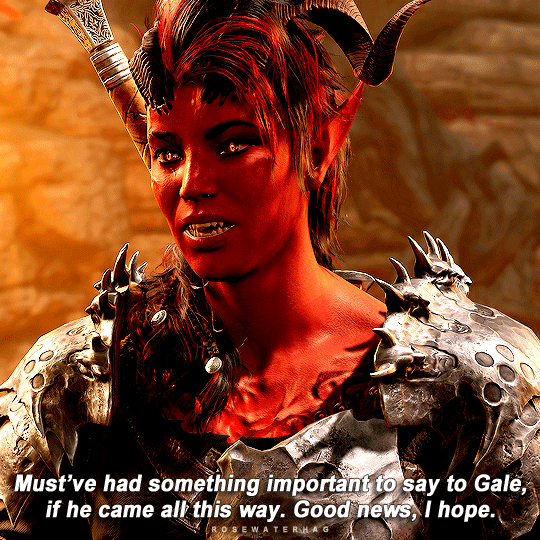
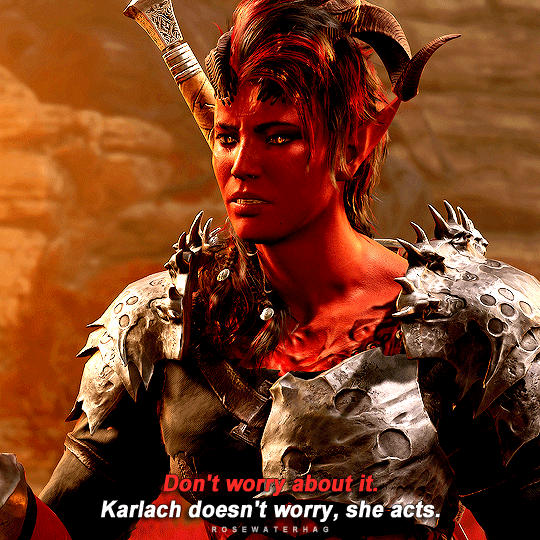
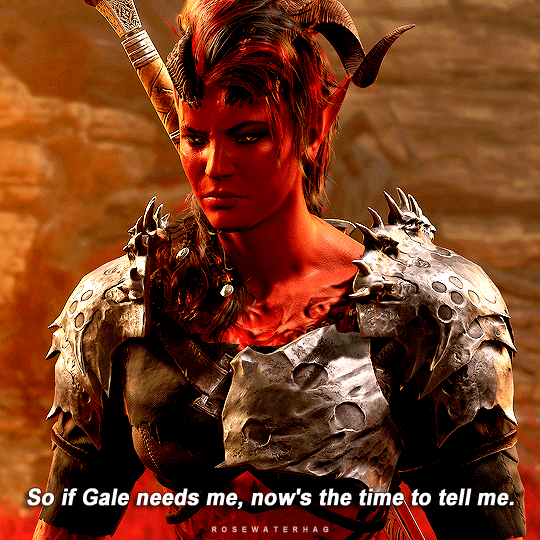
Karlach: Aw, was that Gale’s granddad? Player: That was Elminster Aumar - the most famous wizard in the realms. Karlach: Huh. Doesn’t ring a bell.
#bg3edit#baldur's gate 3#bg3#baldurs gate 3#karlach#karlach cliffgate#gale dekarios#gale of waterdeep#karlach x gale#gale x karlach#dailygaming#gamingedit#ch: karlach#ch: gale dekarios#vg: baldur's gate 3#series: baldur's gate#gif: mybg3#ever since i wrote that longer meta about their relationship and how it progresses throughout the game#i wanted to make this gifset#whether you view it through a lense of friendship or romance#the way she cares about him and goes to bat for him#out of all the companions#truly endeared me to her
617 notes
·
View notes
Text

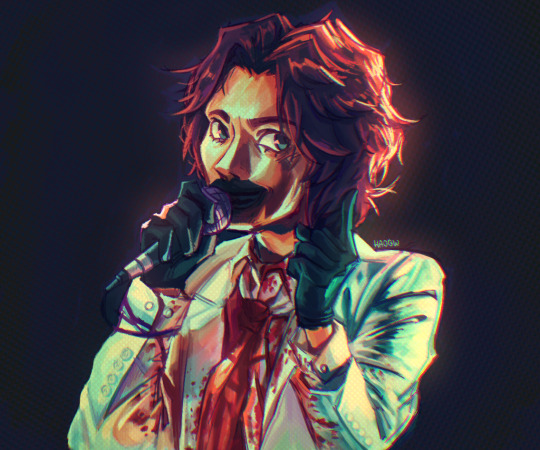
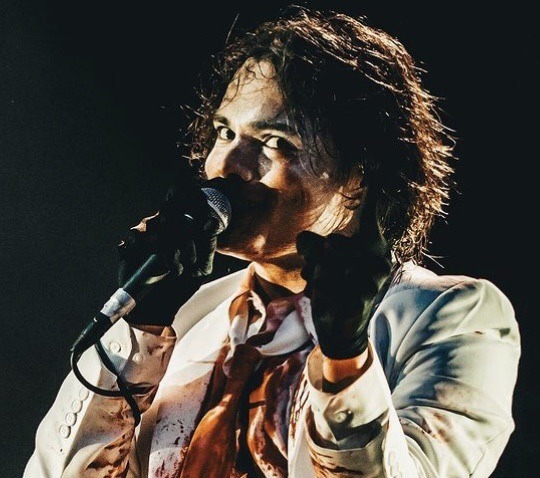
gerard way cured my art block
normal version without chromatic aberration :P
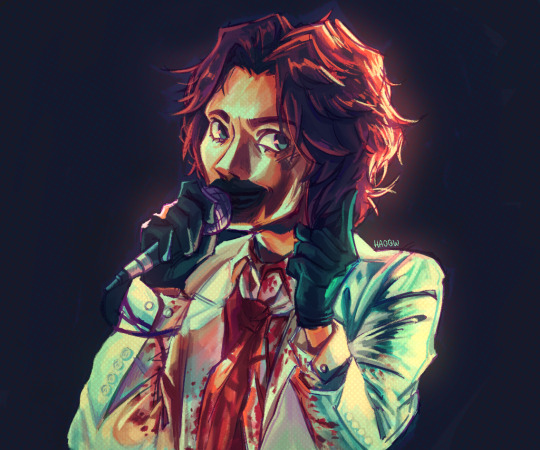
#idk what to caption this LOL sorry#my art#my chemical romance#mcr#mcr fanart#meta man#meta man gerard way#gerard way fanart#mcr art#gerard way#gee way#g way#mcr gerard#fanart#sketch#artists on tumblr
823 notes
·
View notes